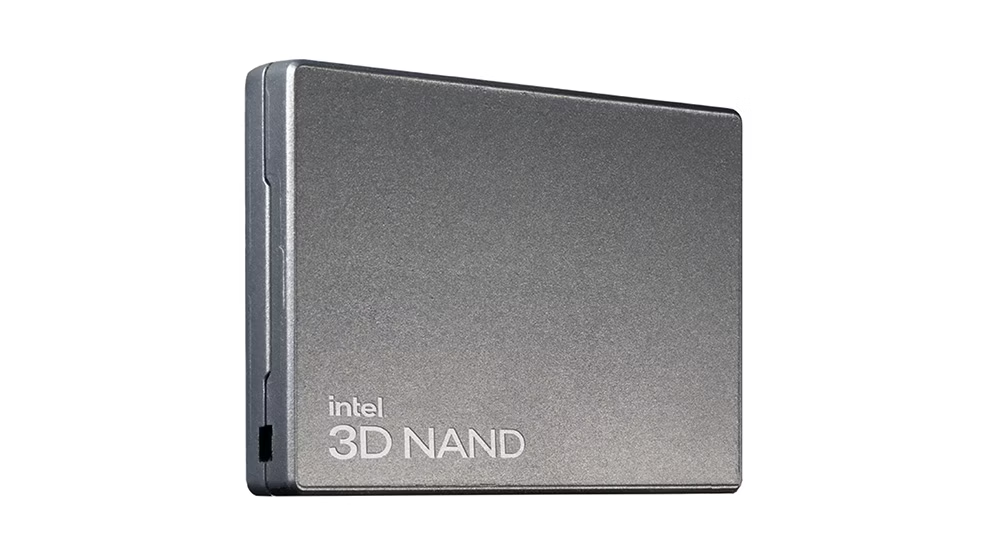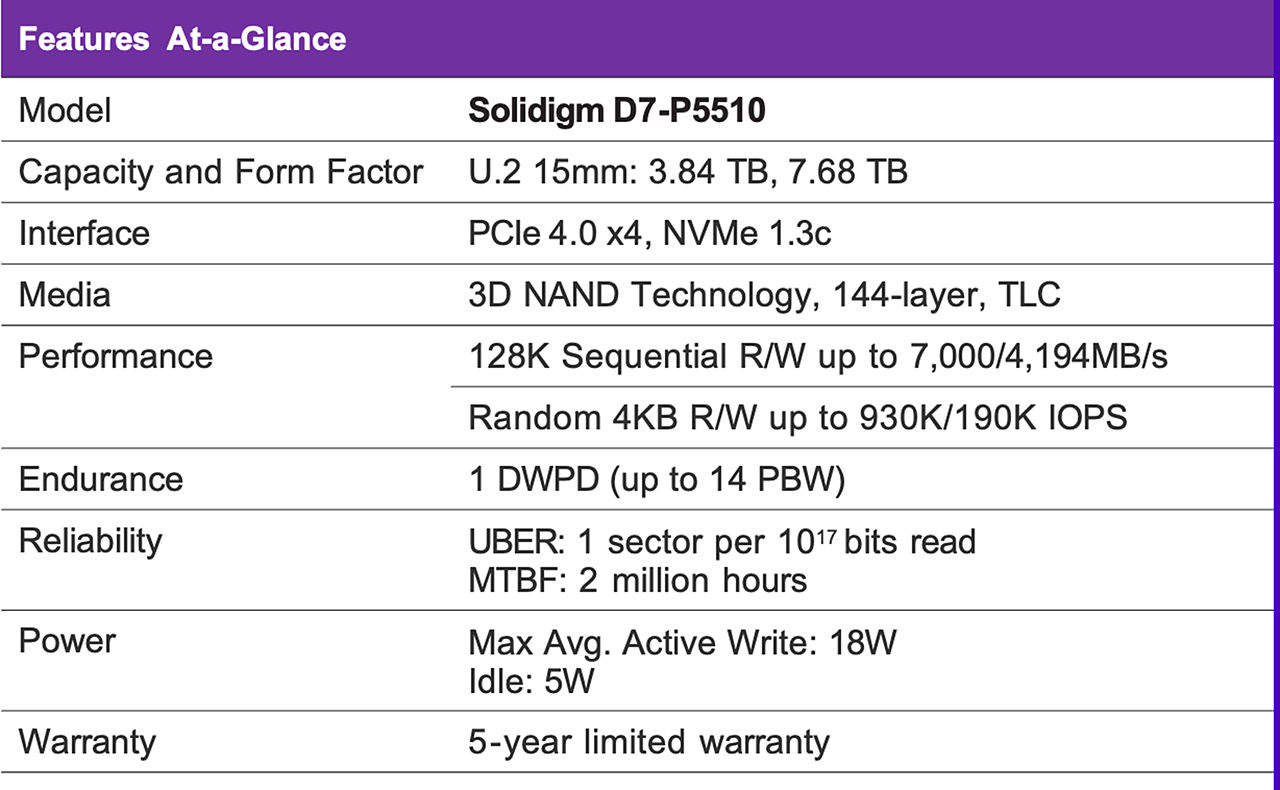Solidigm™ D7-P5510 Product Brief
Formerly Intel® SSD D7-P5510
Architected with 144-layer, TLC, 3D NAND technology, the Solidigm D7-P5510 offers optimized performance and capacity for all-flash arrays and is designed to advance IT efficiency and data security. The D7-P5510 includes an PCIe 4.0 controller and firmware that brings low latency, enhanced management capabilities, scalability and critical new NVMe features for Enterprise and Cloud environments. Available in the U.2 15mm form factor, this SSD is offered at 3.84TB and 7.68TB with write endurance up to 1 drive write per day (DWPD).

Meeting today’s data center performance, manageability, and I/O requirements across a wide range of workloads
- Scale databases while maintaining SLA
- Deploy power-efficient performance
- Responsiveness under mixed I/O
Improve performance with lower latency
The Solidigm D7-P5510 delivers predictably fast high performance and can greatly accelerate all-flash arrays. The performance-optimized D7-P5510 brings up to 2x higher sequential read performance, [1] 50% lower latencies [2] and a 50% increase in mixed workload IOPs (70% read, 30% write) [3] compared to previous-generation SSDs.
A new TRIM architecture further improves the performance on real life workload where dataset management commands are used. Optimized TRIM architecture now runs as a background process without interference to workloads, improving performance and QoS during concurrent TRIMs. The TRIM process is improved with reduced write amplification that helps drives meet their endurance goal.
Firmware enhancements for drive performance, IT efficiency, data security, and manageability
The D7-P5510 include numerous firmware enhancements specifically designed to improve IT efficiency and data security in an increasingly data-centric world.
- Dynamic multiple namespaces enhance runtime provisioning and storage management. Overprovision drive with single smaller namespace to improve endurance and random write performance. [4]
- Expanded LBA format support provides flexibility to host software to pass meta data and protection information along with payload data. Solidigm D7-P5510 supports VSS with the following sector sizes: 512/520/4096/4104/4160B.
- Scatter gather list (SGL) improves performance by removing the need for data alignment at the host.
- Enhanced SMART monitoring, which reports drive health status without disrupting I/O data flow using an in-band mechanism and out-of-band access.
- Device self-test improves customer experience by ensuring devices are operating as expected. Host system can request the storage device (SSD) to perform tests to ensure it is functioning properly including SMART check, volatile memory backup, NVM integrity, drive life.
- Telemetry makes a wide range of stored data accessible and includes intelligent error tracking and logging. This increases the reliability of finding and mitigating issues and supports accelerated qualification cycles—all of which result in increased IT efficiency.
- Additional security features like TCG Opal 2.0, Configurable Namespace Locking, sanitize and format NVM are supported.
- A power-loss imminent (PLI) protection scheme with built-in self-testing guards against data loss if system power is suddenly lost. Coupled with an industry-leading end-to-end data path protection scheme, [5] PLI features also enable ease of deployment into resilient data centers where data corruption from system-level glitches is not tolerated.
NAND technology industry leader
Solidigm’s 144-layer 3D NAND technology delivers industry-leading areal density [6] and data retention, [7] enabling enterprise customers to confidently scale storage arrays to meet their growing needs. The swift adoption of software-defined and hyperconverged infrastructures increases the requirement to maximize efficiency, revitalize existing hardware, and increase server agility—all while maintaining operational reliability.
Top enterprise server manufacturers have responded by openly embracing PCIe/NVMe-based SSDs with scalable performance, low latency, and continuous innovation. Meeting the demand of increasingly I/O-intensive workloads, including AI and Analytics, has become a core element for any enterprise strategy.

Notes
Config for footnotes 1-3: est and System Configuration: Mainboard: Intel® Server Board S2600WFT, Version: R2208WFTZS, BIOS: SE5C620.86B.00.01.0014.070920180847, Platform architecture: x86_64, CPU: Intel® Xeon® Gold 6140 CPU @ 2.30GHz, CPU Sockets: 2, RAM Capacity: 32G, RAM Model: DDR4, OS version: centos-release-7-5, Build id: 1804, kernel: 4.14.74, NVMe Driver: Inbox, Fio version: 3.5, PCIe 4.0 switch from Microsemi was used. P5510, P5316 were tested on JCV10100 and ACV10005 firmware respectively.
[1] Up to 2.00x Better Sequential Read Performance - Claim is based on D7-P5510 128KB Sequential Read (7.0GB/s) over DC-P4510 128KB Sequential Read (3.20GB/s). Date of Test: October 2020.
[2] Up to 50% Better Latency – Claim is based on 4KB Random 75/25 Workload at 6(9s). D7-5510 (1100us) is 50% better latency than DC-P4510 (2539us). Date of Test: October 2020.
[3] Up to 50% Better Mixed Workload IOPs- Claim is based on D7-P5510, 7.684TB 4KB mixed 70/30 (400K) over DC-P4510, 8TB (266K). Date of Test: October 2020.
[4] Overprovision drives with single smaller namespace benefit can be found through this article: https://www.intel.com/content/dam/www/public/us/en/documents/white-papers/over-provisioning-nand-based-ssds-better-endurance-whitepaper.pdf
[5] Source – Los Alamos. Drives tested at source: Los Alamos Neutron Science Center, https://lansce.lanl.gov/facilities/wnr/index.php. 10^6 neutron acceleration factor. Test performed on single port SSDs, DC S3520, DC P3520, DC P3510, DC P4500, DC S4500, DC P4800X, D7-P55XX, D7-P56XX, Samsung PM953,
Samsung PM1725, Samsung PM961, Samsung PM863, Samsung PM963, Samsung 860DCT, Samsung PM883, Samsung PM983, Micron 7100, Micron 510DC, Micron 9100, Micron 5100, Micron 5200, HGST SN100, Seagate 1200.2, SanDisk CS ECO, Toshiba XGS, Toshiba Z6000 drives. Zero silent data corruption measured in Intel single port drives representing cumulative measurement time > 5 million hours. Neutron radiation is used to determine silent data corruption rates and as a measure of overall end-to-end data protection effectiveness. Among the causes of data corruption in an SSD controller are ionizing radiation, and SRAM instability. Silent errors were measured at run-time and at post-reboot after a drive “hang” by comparing expected data vs actual data returned by drive. The annual rate of data corruption was projected from the rate during accelerated testing divided by the acceleration of the beam (see JEDEC standard JESD89B/C).
[6] Source: ISSCC 2015, J. Im; ISSCC 2017 R Yamashita; ISSCC 2017 C Kim; ISSCC 2018; H. Maejima; ISSCC 2019 C. Siau.
[7] Measurements were performed on components from SSDs using floating gate and charge trap flash technology. Measurement platform used was Teradyne Magnum 2 Memory test systems, and programming using random patterns and margins were quantified using customer commands. Data measured in 08/2019.
Performance varies by use, configuration and other factors.
Performance results are based on testing as of dates shown in configurations and may not reflect all publicly available updates. See backup for configuration details. No product or component can be absolutely secure.
Your costs and results may vary.
Solidigm does not control or audit third-party data. You should consult other sources to evaluate accuracy. Solidigm technologies may require enabled hardware, software, or service activation.
© Solidigm. Solidigm and the Solidigm logo are trademarks of Solidigm in the U.S. and/or other countries. Other names and brands may be claimed as the property of others.